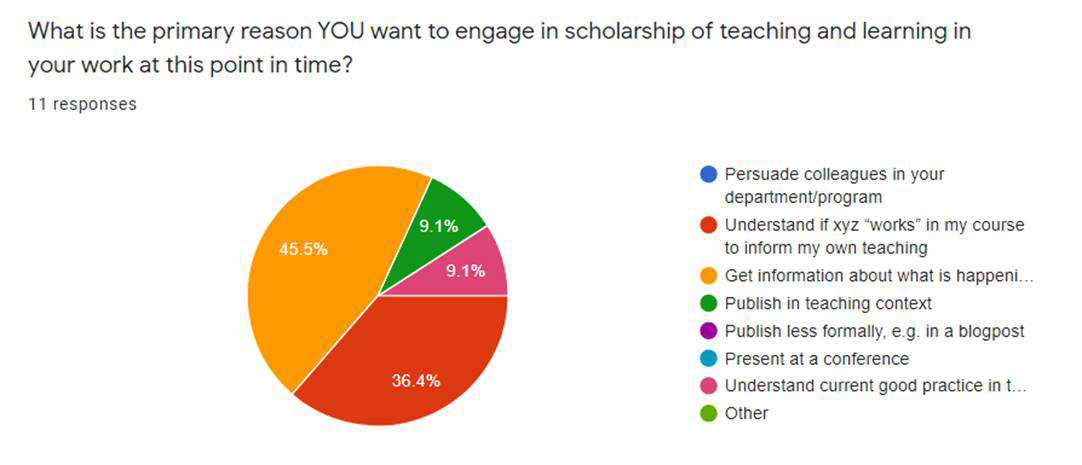lessons from a journal club: investigating student learning – post 3: reasons for doing systematic inquiry and final reflections
by leah marion roberts, senior graduate teaching fellow
welcome to the final post in this series on systematic inquiry in teaching and learning contexts.
this spring, cynthia brame and i facilitated a journal club looking at different ways to investigate student learning. in this blog series, i’m sharing some highlights of our collective learning, organized thematically by the types of questions instructors could ask. the first post explored the difference between research questions that ask “what is?” versus “what works?”. the second post looked at the differences between affective versus cognitive research questions and qualitative versus quantitative approaches.
this final post poses reflection questions for instructors about their motivations and reasons for doing systemic inquiry in their classes. it also highlights some of the key takeaways that participants shared with us about their experience in this journal club.
theme 4: why do systematic inquiry?
understanding our reasons for doing research can help us ask more poignant questions and clarify the scope of our research project. here are some (non- exhaustive!) reasons we came up with for asking systemtiac questions about our courses:
- to understand if xyz “works” in my course to inform my own teaching
- to get information about what is happening in my courses to inform my own teaching
- to persuade colleagues in your department/program
- to publish in a teaching journal
- to publish less formally (e.g. in a blogpost)
- to present at a conference
- to understand current good practice in teaching & learning in my discipline
- other
recognizing that most of us have multiple reasons for wanting to pursue research in our classes, we asked participants to pick their one primary reason from the list above. here’s what they said:
the majority of participants’ primary reason for doing research in their classrooms is to understand what is happening in their courses in order to inform their teaching. one participant explained that she wanted some baseline knowledge to plan a path forward. she wanted to draw on literature on teaching and learning in her discipline to inform her questions; however, her goal was to understand student experiences in her courses for her own and her colleagues’ learning — not to contribute new knowledge to the field, necessarily.
another participant had taught the same course for four years and had observed disparities in students’ ability to understand and apply theory from readings or discussion and she didn’t understand what was driving this difference. prior knowledge? reading skills? something else? she therefore wanted to understand what contributed to these disparities in order to be able to strategize teaching methods that could help eliminate such disparities.
it is okay to ask questions about the conditions of the class (what is?) before trying to offer solutions about what works.
one of the graduate student participants expressed the desire to publish in a teaching context because she wants her career to focus on teaching and learning.
overall, the take home point was: there are many reasons to do research on teaching and learning in our courses! understanding our goals will help us make decisions about our research design.
overview: key take-aways
during our last session, we asked all participants to write one core lesson they took away from this journal club. here’s what they had to say:
- there are so many things we can explore in our teaching – the problem is deciding what to explore, not whether to explore.
- teaching and learning research can happen in a greater variety of ways than i initially thought and can be disseminated in a multitude of ways outside of academic journals that are meaningful and useful.
- on a very practical level, the benefit of having these meetings every other week versus once a month. it allowed me to stay more engaged with the idea of running a sotl project and will make it more likely that i undertake this project.
- it is okay to ask questions about the conditions of the class (what is?) before trying to offer solutions about what works.
- collecting data on student learning is not as difficult as i originally thought it was! additionally, there is so much literature out there on student learning that i am excited to dig into this summer when i have room to breathe!
- starting with small questions — and perhaps finding ways to challenge our own assumptions of what should be asked—can be useful.
- i learned about different ways that teaching-focused research can be done and the myriad approaches that are possible.
- simply: systematic inquiry in teaching and learning contexts is valuable!
- i think i have a much better idea of how questions are categorized or proposed in papers (i.e., what is/what works), and the tools that authors have used to answer those questions (i.e., surveys vs. grades vs. interviews, etc).
- it’s important to draw upon previous literature in the teaching and learning field. but also not to rely entirely on what has already been done – it’s completely feasible to re-investigate student learning and answer specific questions you have on your own! whether or not it is publishable.
we want to close with a huge thank you to our colleagues in this journal club. thank you to all participants for awesome conversations and contributions to our collective learning!: amanda brockman, sociology; celina callahan-kapoor, medicine health and society; jessica gilpin, biological sciences; rachel hanebutt, human and organizational development; brielle harbin, political science; sara mayeux, law; danielle picard, medicine health and society; josé luis de ramón ruiz, spanish and portuguese; cole meier, biological sciences; melanie schuele, hearing and speech sciences; james sears, biological sciences; and ben yett, electrical engineering.
read all the posts from the lessons from a journal club series
.
.
.
.
.
.
.



leave a response